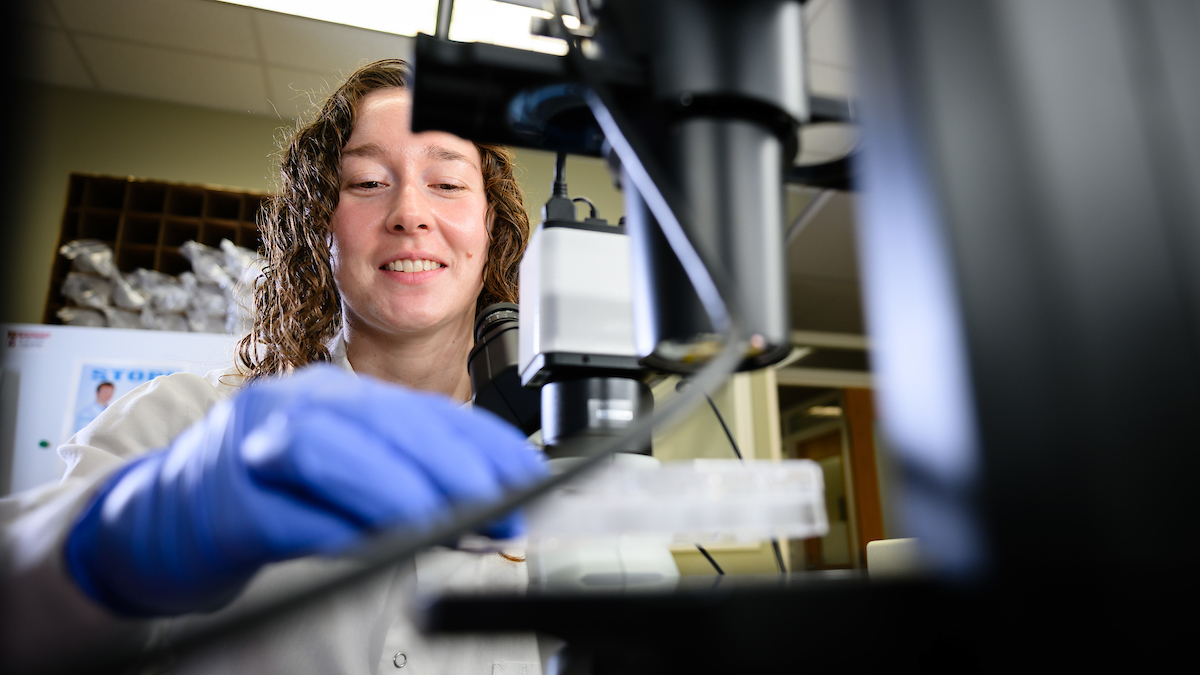Joanne Tuohy Named AKC Canine Health Foundation Clinician-Scientist Fellow
Dr. Joanne L. Tuohy, a post-doctoral oncology resident in the Randall B. Terry, Jr. Companion Animal Veterinary Medical Center at NC State University’s College of Veterinary Medicine, is one of five veterinary residents nationwide to be selected as a 2014 AKC Canine Health Foundation Clinician-Scientist Fellow.
Dr. Tuohy’s research efforts, which will now receive support from the AKC-Canine Health Foundation (CHF), aim to improve survival times in canine osteosarcoma through targeting of metastatic disease by harnessing the anti-tumor activity of monocytes. Osteosarcoma is the most common bone cancer in dogs. Large and giant breeds such as the Irish Wolfhound, Great Dane, Greyhound, Scottish Deerhound, Rottweiler, Boxer, Saint Bernard, and Irish Setter are most affected.
“The Fellows are future leaders within the veterinary profession and they are working to make an impact on canine and human health,” says Dr. Shila Nordone, CHF Chief Scientific Officer. “Support of clinician-scientist training is one way in which we can broadly support our donors. We must have a healthy and robust veterinary biomedical research community in order to have cutting-edge research; we can’t have one without the other. We are honored to be able to support these brilliant young scientists and foster their commitment to canine health.”
Dr. Tuohy has been a co-investigator on numerous research grants, including CHF Acorn grant 1903: ”Phenotypic and functional characterization of differences between monocytes in dogs with and without osteosarcoma.”
In announcing the fellowship, the AKC-CHF release notes, “Canine osteosarcoma is a devastating disease and survival times have not improved dramatically due to lack of metastasis control; therefore, new avenues of investigation are needed. Dr. Tuohy aims to advance the ability to control and prevent metastasis associated with osteosarcoma in dogs.”
Dr. Tuohy’s Fellowship Research Project is described on the AKC-CHF web site:
Even after surgical tumor removal and chemotherapy, the cancer often metastasizes and dogs usually die of metastatic disease within an average of 12 months after diagnosis, despite aggressive therapy. Survival times have not greatly improved during the last 20 years. However, interestingly, survival times double in osteosarcoma patients who develop infections associated with surgical removal of the primary tumor. These infections may be capable of activating white blood cells such as monocytes to promote anti-tumor activity, as has been demonstrated in mouse models. The role of monocytes needs to be better understood in order to exploit their anti-tumor capabilities. In initial studies made possible by an Acorn grant from the AKC Canine Health Foundation, Dr. Tuohy characterized phenotypic and functional differences between monocytes from healthy dogs, and osteosarcoma dogs. Through identifying phenotypic differences between monocytes from healthy dogs and osteosarcoma dogs, preliminary data suggest there may be important functional differences. These differences will enable us to start differentiating canine monocytes into understanding which characteristics may be associated with improved survival, and more importantly, help us to understand how to “reprogram” the monocyte to enable anti-tumor function. This avenue of investigation offers real promise for therapies that direct the immune response to eliminate metastasis.
Established in 2013, the AKC-CHF Clinician-Scientist Fellowship Program seeks to encourage and support the next generation of canine health researchers in order to sustain future advancements in canine and human health. Dr. Kristin Manning, an internal medicine resident at the NC State College of Veterinary Medicine, received Fellowship support in 2013 to study regenerative medicine approaches to the treatment of canine urinary incontinence.
Since 1995, CHF has provided $3,497,409 through 48 grants to NC State CVM researchers.


